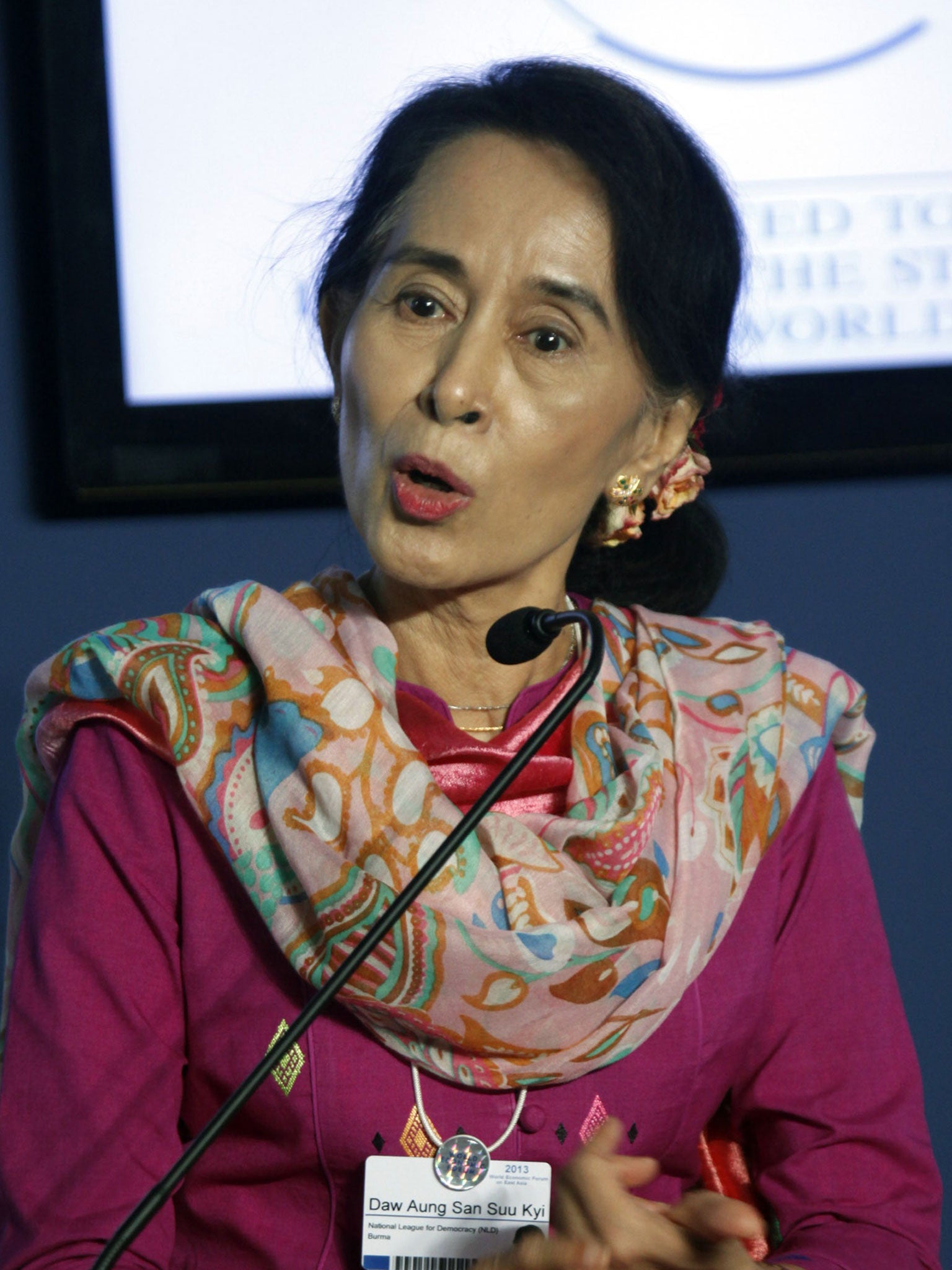Burma's opposition leader Aung San Suu Kyi 'honest' about desire to become the country's president

Burma's opposition leader Aung San Suu Kyi has underlined her desire to become the country’s president, saying to pretend otherwise would be dishonest. She also said that if everyone in the country benefited from democratic reforms it would be harder for them to be rolled back.
Speaking at a meeting of the World Economic Forum in the capital Naypyidaw, something that would have been inconceivable just two years ago, Ms Suu Kyi said Burma’s leaders needed to embrace more reforms.
“I want to run for president, and I am quite frank about it,” she said, according to the AFP. “There are those who say that I shouldn't say that I want to run for the presidency, but if I pretended that I don't want to be, I wouldn't be honest. And I want to be honest to my people.”
Ms Suu Kyi and around four-dozen of her colleagues from the National League for Democracy (NLD) were elected to parliament in a by-election held last spring. The NLD is expected to be the largest party following elections scheduled to be held by 2015, when Ms Suu Kyi would be 70.
But for Ms Suu Kyi to be elected president by the parliament there would need to be an amendment to the constitution, introduced in 2008, which blocks anyone who has a foreign spouse or children from the position. The rule was deliberately introduced by then military junta to limit the aspirations of Ms Suu Kyi, whose late husband, Michael Aris, was a British academic. Their two sons are also British.
Changing the constitution is possible but requires a majority of more than 75 per cent of the parliament, where 25 per cent of seats are reserved for unelected military officials. For Ms Suu Kyi and the NLD to achieve its aim, they would need to persuade all of the elected members of the parliament and at least one of the military officers to vote with them.
Asked about the challenge on Thursday, Ms Suu Kyi said: “I don’t believe in indulging in optimism. Changes have to come by endeavour. We are going to work for the constitution to be amended.”
The hosting of the WEF event Naypyidaw underscored the rapid change that has taken place in Burma since President Thein Sein embarked on a series of democratic reforms and released Ms Suu Kyi from house arrest. Most US and EU sanctions were suspended last year and a host of Western companies have rushed to Burma looking to do business with a country that was largely off-limits for decades.
Earlier this week, the consultancy firm McKinsey estimated that Burma’s economy could quadruple by 2030 if it was able to attract sufficient investment. Western companies are keen to strike deals for Burma’s array of natural resources, though they face tough competition from companies from China, Thailand, South Korea and India, which have been operating there for some years.
“You come to Myanmar at a pivotal moment in our history. We are working hard to move from military rule to democracy,” Thein Sein told delegates at Thursday’s opening ceremony. “I promise you that we will not waver in this task.”
Earlier this week, Britain’s most senior military officer, Gen Sir David Richards, spent two days in Burma, meeting with civilian and military leaders. Sir David, chief of the British defence staff, said in a statement he had discussed with his military counterparts the “importance of security sector reform, and the role of the armed forces in a democratic system”.
He also said he talked about the possibility of training cooperation between Burmese and UK forces, though a ministry of defence spokesman said nothing had been agreed so far. Burma has a sizeable but ill-equipped military and would be a target for Western arms manufacturers should sanctions that still prohibit the sale of weapons to the country be lifted
But while Burma is attracting businesses and wooing opinion makers in Naypyidaw, critics say the country needs to make many more reforms. They also point to ongoing ethnic and religious conflicts in the country. More than 140,000 Muslim Rohingya refugees remain living in wretched conditions in tent camps in the western state of Rakhine following anti-Muslim violence last year that left more than 200 people dead.
Zoya Phan, an activist who was forced to flee Burma in 1995, said she was recognised as a young global leader by the World Economic Forum and attended a 2010 event in Tanzania. Yet she said she remained on a government black-list and could not return to her own country. She also said hundreds of political prisoners remained behind bars.
“I would ask those delegates to take a look at Burma beyond Naypyidaw and Rangoon,” said Mr Phan, who now works with the Burma Campaign UK “In Kachin state there is violence, in Rakhine there is violence against the Rohingya.”
Ms Phan, who wrote of her experiences in a memoir, Little Daughter, added: “On the surface it looks as if things are changing. But if you dig a little deeper you will see it is not.”
Subscribe to Independent Premium to bookmark this article
Want to bookmark your favourite articles and stories to read or reference later? Start your Independent Premium subscription today.

Join our commenting forum
Join thought-provoking conversations, follow other Independent readers and see their replies